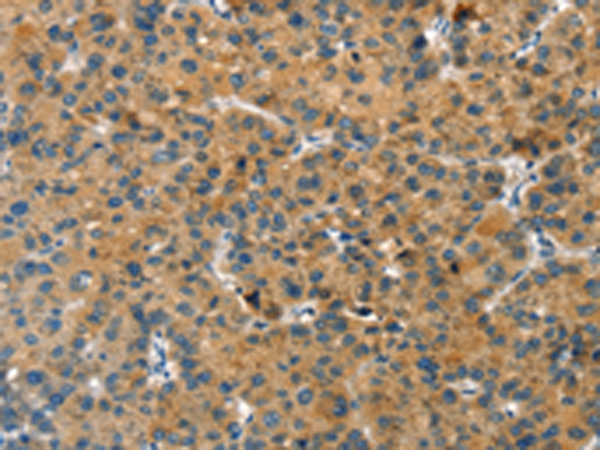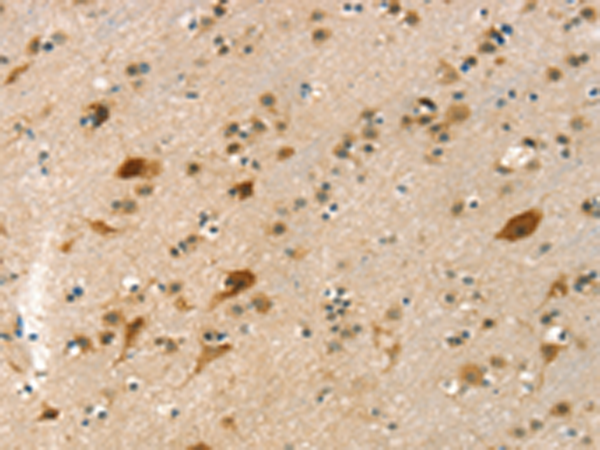


| WB | 1/500-1/2000 | Human,Mouse,Rat |
| IF | 咨询技术 | Human,Mouse,Rat |
| IHC | 1/25-1/100 | Human,Mouse,Rat |
| ICC | 技术咨询 | Human,Mouse,Rat |
| FCM | 咨询技术 | Human,Mouse,Rat |
| Elisa | 1/2000-1/5000 | Human,Mouse,Rat |
| Aliases | H12.3; HLC-7; PIG21; GNB2L1; Gnb2-rs1 |
| WB Predicted band size | 35 kDa |
| Host/Isotype | Rabbit IgG |
| Antibody Type | Primary antibody |
| Storage | Store at 4°C short term. Aliquot and store at -20°C long term. Avoid freeze/thaw cycles. |
| Species Reactivity | Human, Mouse, Rat |
| Immunogen | Fusion protein of human RACK1 |
| Formulation | Purified antibody in PBS with 0.05% sodium azide and 50% glycerol. |
+ +
以下是关于RACK1抗体的3篇参考文献及其简要摘要:
---
1. **文献名称**:*RACK1. a receptor for activated C-kinase and a homolog of the β subunit of G proteins, inhibits activity of src tyrosine kinases and growth of NIH 3T3 cells*
**作者**:Chang, B. Y., et al.
**摘要**:该研究揭示了RACK1作为PKC信号通路的支架蛋白,通过抑制Src激酶活性调控细胞增殖。研究中使用RACK1抗体进行免疫共沉淀,证实RACK1与Src的直接相互作用,并发现其过表达可抑制NIH 3T3细胞的生长。
---
2. **文献名称**:*RACK1 interacts with E1A and rescues mutant E1A-induced apoptosis*
**作者**:Hermanto, U., et al.
**摘要**:文章阐明了RACK1与腺病毒E1A蛋白的相互作用及其在细胞凋亡中的保护作用。通过Western blot和免疫荧光技术(使用RACK1抗体),研究发现RACK1能够结合突变型E1A并抑制其诱导的p53依赖性凋亡,提示其在癌症中的潜在调控机制。
---
3. **文献名称**:*RACK1 regulates directional cell migration by acting on Gβγ at the interface with its effectors PLCβ and PI3Kγ*
**作者**:Lai, B. T., et al.
**摘要**:该研究利用RACK1抗体进行免疫沉淀和细胞定位实验,发现RACK1通过结合Gβγ亚基调控PLCβ和PI3Kγ的活性,从而影响趋化因子诱导的细胞定向迁移,为RACK1在肿瘤转移中的作用提供了分子机制支持。
---
**备注**:以上文献均涉及RACK1抗体的实验应用(如Western blot、免疫共沉淀等),并聚焦于RACK1在信号转导、凋亡调控及细胞迁移中的功能。如需具体文献来源或更早年的研究,可进一步通过PubMed或Web of Science检索DOI编号。
RACK1 (Receptor for Activated C Kinase 1) is a highly conserved scaffolding protein belonging to the WD40 repeat family, playing a pivotal role in diverse cellular processes. It was initially identified as an anchoring protein for protein kinase C (PKC), facilitating its translocation and activation. Beyond PKC signaling, RACK1 interacts with multiple partners, including Src kinases, integrins, growth factor receptors, and ribosomal components, regulating pathways tied to cell growth, migration, apoptosis, and immune responses. Its involvement in ribosome binding also links it to translational control.
RACK1 antibodies are essential tools for studying its expression, localization, and molecular interactions. These antibodies are widely used in techniques like Western blotting, immunoprecipitation, and immunofluorescence to explore RACK1’s role in physiological and pathological contexts. Dysregulation of RACK1 has been implicated in cancers, neurodegenerative diseases, and immune disorders, making its antibodies valuable for mechanistic and diagnostic research.
Commercially available RACK1 antibodies are typically raised against conserved regions (e.g., human residues 165-317), with validation across species (human, mouse, rat). Clonality (monoclonal/polyclonal) and host species (rabbit, mouse) vary, tailored to experimental needs. Proper controls (e.g., knockout cell lines) are critical due to potential cross-reactivity with other WD40 proteins. Overall, RACK1 antibodies serve as key reagents in unraveling its multifaceted roles in cellular signaling and disease pathogenesis.
×